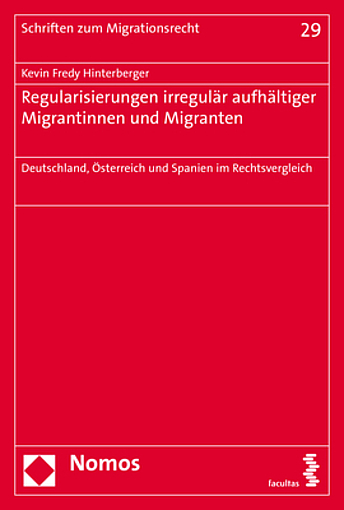englischA key challenge in managing migration at an EU level has been ‘combating’ irregular immigration. This book addresses perhaps one of the most pressing structural problems regarding the EU’s return policy: the enforcement deficit in returning migrants who stay in the EU irregularly to their home countries. Only 40 per cent of return decisions are actually enforced. Possible solutions to this problem can be found in the national legal frameworks of selected EU member states, which is why this study examines Germany, Austria and Spain comparatively. These three member states target the status of ‘irregular residence’ through a sophisticated system of regularisation. Regularisation represents an alternative to sending migrants home and these legal instruments can be understood as any legal decision that grants migrants legal residence. They terminate the irregular stays of migrants by granting them residence permits rather than deporting them. This analysis leads to the following thesis: irregular immigration can be ‘fought’ more effectively with legal forms of regularisation on an EU level, which would effectively complement the existing rules of the EU’s return policy.
Eine zentrale Herausforderung der Migrationssteuerung auf Unionsebene ist die „Bekämpfung“ irregulärer Einwanderung. Die vorliegende Arbeit widmet sich einem der drängendsten Probleme der EU-Rückführungspolitik, in concreto der niedrigen Rückführungsrate irregulär aufhältiger Migrant*innen. Jährlich werden nur rund 40 % aller Rückkehrentscheidungen auch tatsächlich vollzogen. Mögliche Lösungsansätze finden sich in den Rechtsordnungen ausgewählter Mitgliedstaaten. Deshalb wird die deutsche, österreichische und spanische Rechtslage in einem Rechtsvergleich analysiert. Die drei Mitgliedstaaten „bekämpfen“ den irregulären Aufenthalt von Migrant*innen mithilfe eines differenzierten Systems von Regularisierungen. Regularisierungen, verstanden als Rechtsinstrument, stellen eine Alternative zu Rückführungen dar und umschreiben jede rechtliche Entscheidung, die irregulär aufhältigen Migrant*innen ein Aufenthaltsrecht gewährt. Sie beenden den irregulären Aufenthalt von Migrant*innen, allerdings nicht durch eine Rückführung im Sinne einer Außerlandesbringung, sondern durch die Gewährung eines Aufenthaltsrechts. Anhand dieser Untersuchung wird die folgende These entwickelt: Durch unionsrechtlich normierte Regularisierungen, die die derzeitige Rückführungspolitik der EU ergänzen, wird die irreguläre Einwanderung auf Unionsebene wirksamer „bekämpft“.


